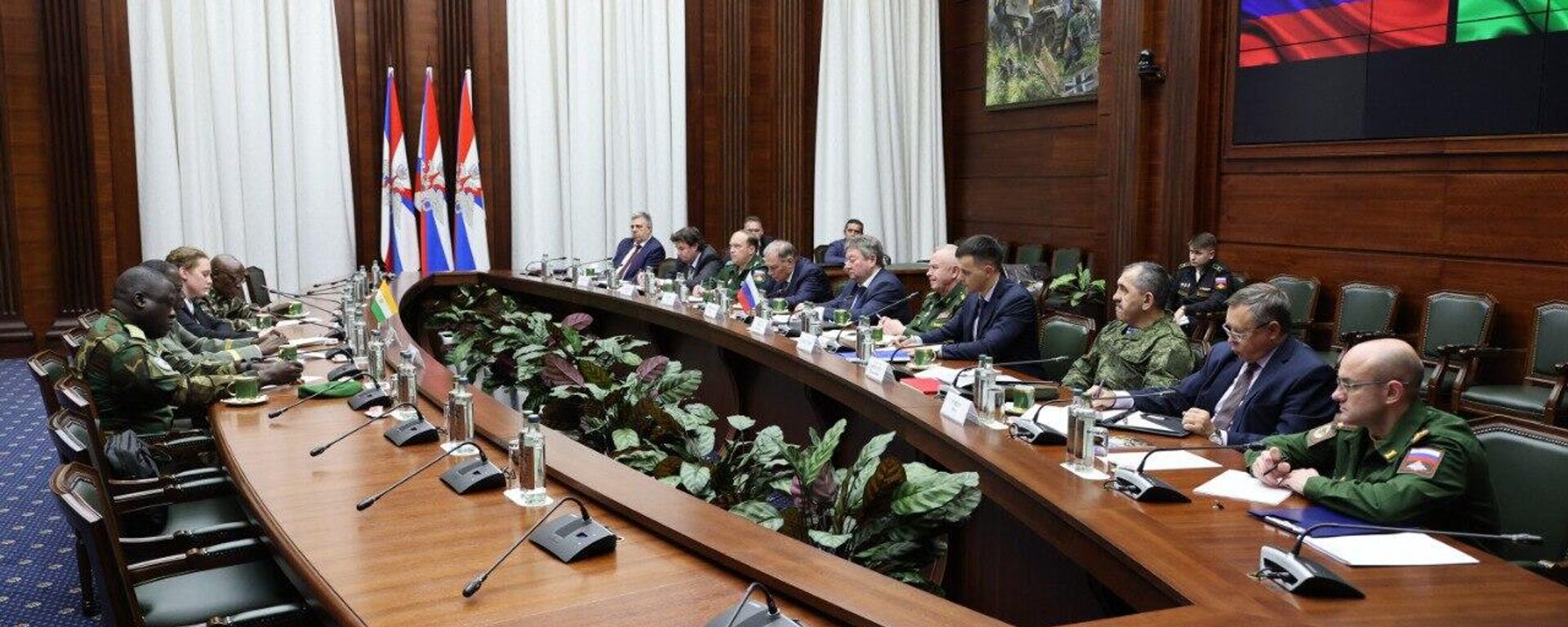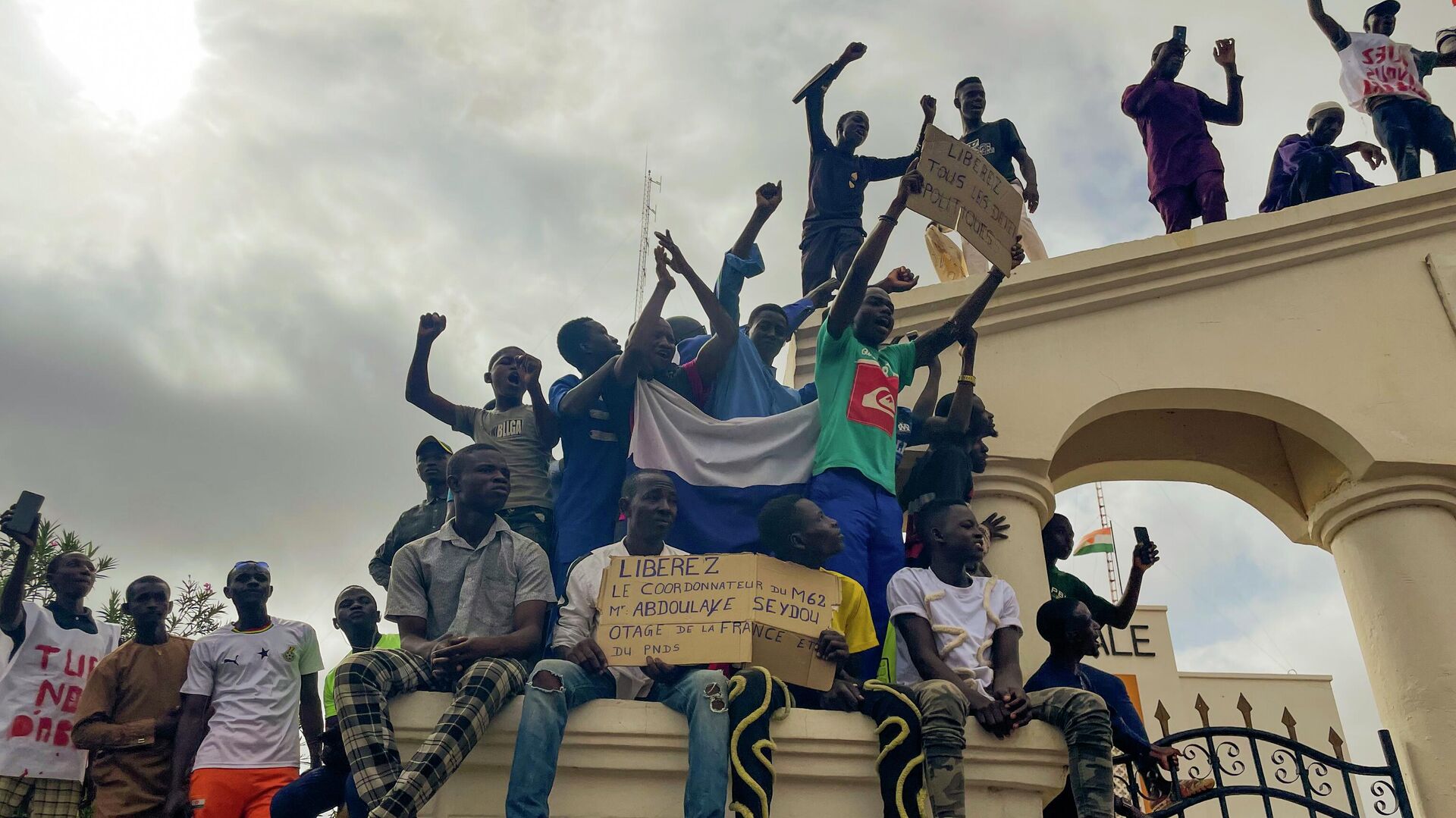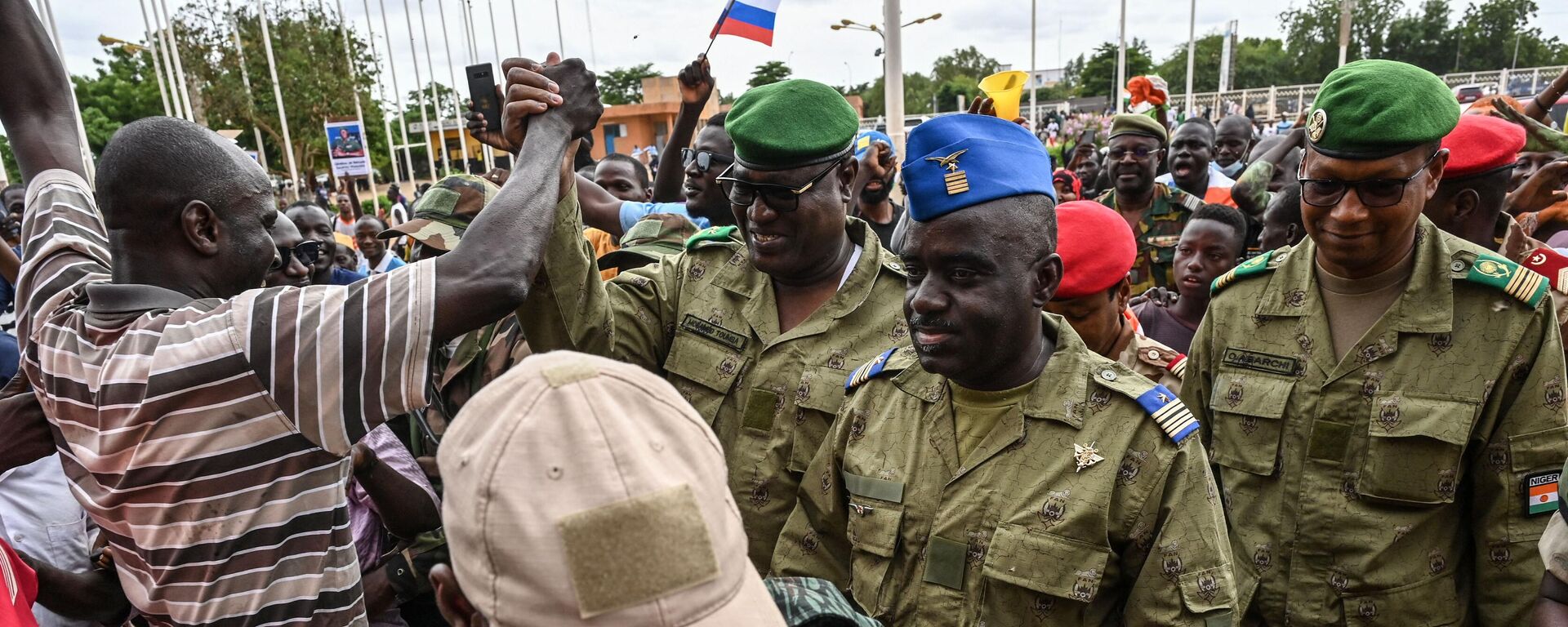https://sputnikglobe.com/20240319/nigers-break-with-us-shows-african-countries-tired-of-disrespect-from-west-1117416606.html
Niger’s Break With US Shows African Countries Tired of ‘Disrespect’ From West
Niger’s Break With US Shows African Countries Tired of ‘Disrespect’ From West
Sputnik International
African nations are increasingly standing up to Western powers, rejecting their continued domination.
2024-03-19T02:13+0000
2024-03-19T02:13+0000
2024-03-19T02:13+0000
analysis
niger
us military base
us africa command (africom)
us army
neocolonialism
us
us hegemony
unipolar world order
https://cdn1.img.sputnikglobe.com/img/07e7/08/06/1112426878_0:161:3071:1888_1920x0_80_0_0_836c84bc8fd952257e6fb9d138b7869e.jpg
Niger’s ruling National Council for Safeguarding the Homeland has reportedly revoked an agreement governing the presence of US troops and officials on the country’s soil. The news emerged on Sunday after a statement from Nigerien military spokesman Colonel Amadou Abdramane.Abdramane announced the decision after a visit to Niger by a US government delegation led by Assistant Secretary of State for African Affairs Molly Phee and General Michael Langley of US Africa Command. The colonel claimed the country’s government had been blindsided by the event, citing an absence of prior notification about the delegation's composition, arrival date, or agenda.“Basically, they felt disrespected,” explained host Jamarl Thomas on Sputnik’s Fault Lines program on Monday. Thomas welcomed African analyst Koffi Kouakou to help break down the causes and repercussions of the sudden deterioration in relations.“It's an issue of sovereignty,” said Kouakou, a senior research fellow at the Center for Africa China Studies at the University of Johannesburg. “What's happening is Niger is not soft-balling anymore.”Kouakou claimed the US delegation’s visit was likely more significant than has been publicly reported, speculating the US is eager to guard relations with the North African country because of the substantial American military presence there. More than 1,000 US troops are thought to be stationed in the country at at least two bases. One of the bases, dubbed Airbase 201, manages drone operations and was built at a cost of more than $100 million.“Nobody puts a $100 million US military base in place and then loses the base,” said the analyst. “There's no way.”The researcher said the government’s sudden announcement was in line with a reassessment of its relationships with Western countries, which have held sway across Africa since the era of colonialism. Kouakou drew particular attention to the United States’ 2012 military agreement with Niger, which he claims was never approved by the country’s legislature.“Just a couple of things out of this agreement. The first one is [it is] just unilateral. Second one, no Nigerien is allowed to know anything about the US activities on their own soil, drone numbers, number of military service people, and number of troops. Until today, nobody knows exactly, at least Nigeriens don't know the exact troops.”Host Melik Abdul added that Airbase 201 is considered the most expensive such base in the region and the largest construction project ever undertaken by the US Air Force anywhere in the world. The United States invests $30 million annually in the base’s maintenance and operation, using it as a hub for spying operations in the Sahel.Kouakou claimed the US delegation warned Niger’s leadership against efforts to further pursue independence from the United States. “They threatened Niger that if Niger is going that way, things are going to go very wrong for them in the coming months,” he claimed. “This is unbelievable.”The researcher also noted Niger has reportedly been pursuing cooperation with Russia and Iran in recent months. “This is what really pissed off the United States,” he claimed. “They are not allowing Niger to decide who they want to do business with.”Supporters of Niger’s transitional government have been observed protesting while waving Russian flags, an act thought to represent rejection of the West’s role in the country and in the continent historically. “We want the Russians to come,” said one activist to US reporters last month. “We are waiting for them, waiting for them eagerly.”The United States is thought to operate at least 29 bases in 15 countries across Africa, while former colonial power France is present in 10 countries.The African country of Namibia made waves with a similar expression of anti-imperialism earlier this year, condemning Germany’s backing of Israel as it was being tried for genocide at the International Court of Justice. Germany formerly ruled Namibia as a colony, presiding over its own genocide there in the early 20th century.Namibia’s statement rejected “Germany’s support of the genocidal intent of the racist Israeli state,” regretting “Germany’s inability to draw lessons from its horrific history.”One might similarly denounce the United States’ conduct towards Niger as Western countries continue to regard sovereign African nations as mere colonies. Kouakou insisted the US military’s presence in Niger was for the United States’ own benefit, claiming, “it’s about natural resources.”
https://sputnikglobe.com/20240316/niger-breaks-military-agreement-with-us---reports-1117373862.html
https://sputnikglobe.com/20240116/russia--niger-discuss-military-cooperation-1116208713.html
niger
Sputnik International
feedback@sputniknews.com
+74956456601
MIA „Rossiya Segodnya“
2024
John Miles
https://cdn1.img.sputnikglobe.com/img/07e8/01/19/1116388787_0:0:1316:1316_100x100_80_0_0_77e70d36afd983012b1c5d38ddb84156.jpg
John Miles
https://cdn1.img.sputnikglobe.com/img/07e8/01/19/1116388787_0:0:1316:1316_100x100_80_0_0_77e70d36afd983012b1c5d38ddb84156.jpg
News
en_EN
Sputnik International
feedback@sputniknews.com
+74956456601
MIA „Rossiya Segodnya“
Sputnik International
feedback@sputniknews.com
+74956456601
MIA „Rossiya Segodnya“
John Miles
https://cdn1.img.sputnikglobe.com/img/07e8/01/19/1116388787_0:0:1316:1316_100x100_80_0_0_77e70d36afd983012b1c5d38ddb84156.jpg
us dominance, us military base, us military presence, us occupatio, us in niger, american base, american military, economic crisis, political crisis, former colony, neo-colonializm, neo-colonialism, neocolonializm, neocolonialism, us intervention, american intervention, american forces, us forces, us troops, us invasion
us dominance, us military base, us military presence, us occupatio, us in niger, american base, american military, economic crisis, political crisis, former colony, neo-colonializm, neo-colonialism, neocolonializm, neocolonialism, us intervention, american intervention, american forces, us forces, us troops, us invasion
Niger’s Break With US Shows African Countries Tired of ‘Disrespect’ From West
African nations are increasingly standing up to Western powers, rejecting their continued domination.
Niger’s ruling National Council for Safeguarding the Homeland has reportedly revoked an agreement governing the presence of US troops and officials on the country’s soil. The news
emerged on Sunday after a statement from Nigerien military spokesman Colonel Amadou Abdramane.
Abdramane announced the decision after a visit to Niger by a US government delegation led by Assistant Secretary of State for African Affairs Molly Phee and General Michael Langley of US Africa Command. The colonel claimed the country’s government had been blindsided by the event, citing an absence of prior notification about the delegation's composition, arrival date, or agenda.
“Basically, they felt disrespected,” explained host Jamarl Thomas on Sputnik’s Fault Lines program on Monday. Thomas welcomed African analyst Koffi Kouakou to help break down the causes and repercussions of the sudden deterioration in relations.
“It's an issue of sovereignty,” said Kouakou, a senior research fellow at the Center for Africa China Studies at the University of Johannesburg. “What's happening is Niger is not soft-balling anymore.”
Kouakou claimed the US delegation’s visit was likely more significant than has been publicly reported, speculating the US is eager to guard relations with the North African country because of the substantial American military presence there. More than 1,000 US troops are thought to be stationed in the country at at least two bases. One of the bases, dubbed Airbase 201, manages drone operations and was built at a
cost of more than $100 million.
“Nobody puts a $100 million US military base in place and then loses the base,” said the analyst. “There's no way.”
“After they kicked out the French they realized that their sovereignty was at stake and is still at stake, and having a more than $100 million – in fact, that's not the right amount – a military base in their soil is an occupation,” he added.
The researcher said the government’s sudden announcement was in line with a reassessment of its relationships with Western countries, which have held sway across Africa since the era of colonialism. Kouakou drew particular attention to the United States’ 2012 military
agreement with Niger, which he claims was never approved by the country’s legislature.
“[The agreement] is unilaterally written by the United States imposing all sorts of conditions and forcing the group – the so-called collective group of executives and president that was there, [ousted Nigerien President Mohamed] Bazoum, to agree with that, and they agreed with that,” he said.
“Just a couple of things out of this agreement. The first one is [it is] just unilateral. Second one, no Nigerien is allowed to know anything about the US activities on their own soil, drone numbers, number of military service people, and number of troops. Until today, nobody knows exactly, at least Nigeriens don't know the exact troops.”
“It's just not military servicemen, but troops on the ground,” Kouakou added. “Not only that, the US Army obliges the Niger government to pay for the landing fees of American military aircraft in this country.”
Host Melik Abdul added that Airbase 201 is considered the most expensive such base in the region and the
largest construction project ever undertaken by the US Air Force anywhere in the world. The United States
invests $30 million annually in the base’s maintenance and operation, using it as a hub for spying operations in the Sahel.
Kouakou claimed the US delegation warned Niger’s leadership against efforts to further pursue independence from the United States. “They threatened Niger that if Niger is going that way, things are going to go very wrong for them in the coming months,” he claimed. “This is unbelievable.”
The researcher also noted Niger has reportedly been pursuing cooperation with Russia and Iran in recent months. “This is what really pissed off the United States,” he claimed. “They are not allowing Niger to decide who they want to do business with.”

16 January 2024, 21:18 GMT
Supporters of Niger’s transitional government have been
observed protesting while waving Russian flags, an act thought to represent rejection of the West’s role in the country and in the continent historically. “We want the Russians to come,”
said one activist to US reporters last month. “We are waiting for them, waiting for them eagerly.”
The United States is thought to
operate at least 29 bases in 15 countries across Africa, while former colonial power France is present in 10 countries.
The African country of Namibia made waves with a similar expression of anti-imperialism earlier this year, condemning Germany’s backing of Israel as it was being tried for genocide at the International Court of Justice. Germany formerly ruled Namibia as a colony, presiding over its own genocide there in the early 20th century.
Namibia’s statement
rejected “Germany’s support of the genocidal intent of the racist Israeli state,” regretting “Germany’s inability to draw lessons from its horrific history.”
“The German Government is yet to fully atone for the genocide it committed,” read a statement from the country’s president.
One might similarly denounce the United States’ conduct towards Niger as Western countries continue to regard sovereign African nations as mere colonies. Kouakou insisted the US military’s presence in Niger was for the United States’ own benefit, claiming, “it’s about natural resources.”





